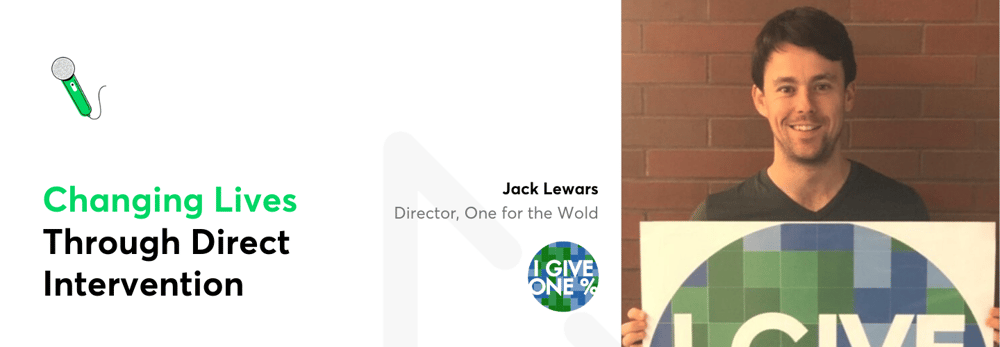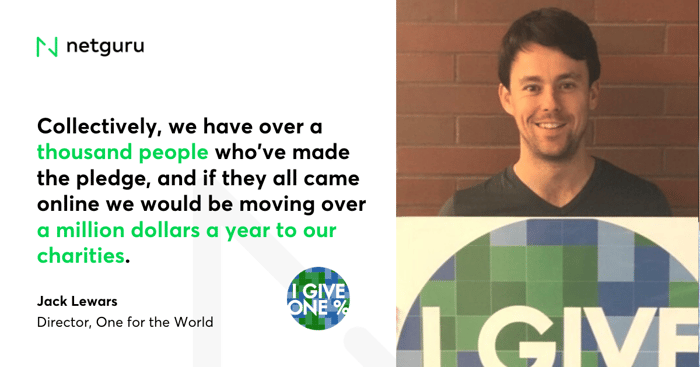Fighting Extreme Poverty Through Effective Altruism

One for the World work with GiveWell, one of the best charity evaluators in the world, who help identify charities that are highly cost effective in helping people living in extreme poverty – which is defined by the World Bank as people living on less than one-dollar ninety per day.
Find out how they are helping to make an impact through effective altruism and what other businesses need to know for the uncertain times ahead.
Radek Zaleski, Netguru: Firstly, how do you manage the interventions at One for the World?
Jack Lewars, One for the World: The interventions we work with are tested to ensure they have a profound impact on people using a method called “randomized controlled trials”, which is typically the process used to test medicines. It's quite topical at the moment with COVID-19 because many of the proposed cures show some promise but they need to be run through a randomized controlled trial to fully test them.
They include providing fortified flour to make food and help ensure people are getting a full nutrient profile, providing insecticide-treated bed nets to protect parents and children from malaria or, in the case of GiveDirectly, they provide unconditional cash transfers to people in extreme poverty.
We can then see positive change for people inside the control group compared to outside – for example, children who don't receive a deworming treatment are more likely to get an intestinal worm and miss school whereas children who do receive a deworming treatment, on average, spend longer in education and thus earn more and thus have better health outcomes from the intervention.
Right now, we have about five hundred people who are giving one percent of their income every month, amounting to three hundred thousand dollars per year. Collectively, we have over a thousand people who've made the pledge, and if they all came online we would be moving over a million dollars a year to our charities.
Have you seen people’s willingness to donate change in recent times?
Jack: We were expecting to run what we call “pledge weeks”, which are week-long pledge drives on university campuses – we were planning on running those in April.
And we're not running any. However we've moved to an “online pledge week” – so we need to see how that goes. On the one hand, we're not signing up hundreds of people this month which we thought we would, but on the other, we haven't had a single person cancel their donation since the start of COVID-19. That’s extremely unusual – I haven't heard of any other non-profit that hasn't had widespread cancellations recently.
Yes, absolutely! And what's the split between graduates and professionals making the pledge to donate one percent?
The majority are students – but we think there is potential to recruit young professionals as well. We're thinking about a strategy that would attract people who are in a corporate environment rather than on a university campus.
I do suspect that we will always appeal to people who are, let's say, under thirty-five – I think there's something about taking up what is supposed to be a lifelong pledge and committing to behavior change that I think is more common when you’re in your twenties.
And what are the challenges in making sure the effects of your donations are really felt on the ground level?
GiveWell, who annually audit charities in serious detail, are quick to identify under-performing interventions.
These organizations sometimes work in fragile and conflict-affected states where it's difficult to do what they do. Many of the countries they work in, almost exclusively in Africa, don’t have strong public infrastructure. Distributing vaccinations is harder than it is in a richer country – they need to understand cultural barriers that there might be towards using certain types of medicine or intervention. Sometimes there are cost barriers. They have to navigate this incredibly complicated landscape.
In recent times, COVID-19 has presented a new set of challenges – their global supply chains are being disrupted. One of our recommended charities, the Malaria Consortium, who give people what’s called ‘seasonal chemo prevention’, source most of their drugs from China – that supply chain has been very heavily disrupted. Another organization we support is called Evidence Action, who both distribute deworming treatments and provide safe water dispensers, are worried that they won't be able to do maintenance on the safe water dispensers and that they won't be able to do face-to-face delivery of these deworming treatments because of social distancing.
We’ve seen how hard it is to operate safely with PPE in New York, let alone in Sub-Saharan Africa.
I can’t imagine what a challenge that is. Has COVID-19 changed your goals for 2020?
One of our key beliefs is that the value of a human life is not changed based on whether or not you know that person or live in the same place as them. I'm not sure everybody agrees with that, but that is something we believe very strongly. The life of someone who lives in London, that I might see most days, does not have an intrinsic value that is higher than the life of someone I will never meet in say, Malawi.
We're really worried that when COVID-19 reaches countries where our recommended charities operate it's going to be catastrophic. If COVID-19 can run through New York like it has, it's really terrifying to think what it would do in a refugee camp where our charities operate. GiveDirectly now has a program in America helping the food assistance program “SNAP” – although we as an organization are not putting money into that, we still think it’s very necessary.
One for the World highlights that program to our donors. The reason we only ask our members for one percent is so that they can do other types of philanthropy, such as helping to fight the coronavirus.
What kind of steps are you taking to increase your footprint and visibility?
The long-term strategy is to try to grow the number of people who've taken our pledge – I would like that to be at least 10,000 people within the next three years.
There is obviously a tendency to just batten down the hatches during a crisis and try to conserve cash. I appreciate that it's a difficult situation, however, we felt like this was an opportunity to invest in things that we wouldn't normally have been able to.
In terms of why we wanted to use Netguru specifically, you came very warmly recommended. We wanted to invest in a professional solution that was going to be scalable over the next few years. We actually do a stand up now because of Netguru – every morning we all meet to discuss changes related to COVID-19 – that was borrowed from you as a way to make sure everybody sees another human at the start of every morning!

What inspires you most at the moment, given that we're seeing a lot of companies giving away training, or celebrities doing book readings?
We've got student volunteers who were supposed to graduate this year – they've lost their graduations, their finals are happening online, they don't get the best summer of their lives between finishing university and starting a job. But rather than sitting there moping about it, they are out there advocating for people to take our pledge. Some will intern with us remotely, throwing ideas at us for stuff they can do. It’s humbling.
Also, the hashtag #passthecheck is a movement in the US for people who want to pass on their check to help others in greater need. That’s also incredible to see.
Any parting words that you'd like people to consider for the uncertain future ahead?
The last nonprofit I started was registered in 2012, pretty much in the worst funding environment for nonprofits, probably ever. The 2008 recession just threw everything into chaos and even though the immediate effects of that have passed, the charitable funding landscape still hasn't recovered.
I think the lesson is – you'd be amazed what you can do in terrible circumstances. If you can get through this, you can get through anything.
One for the World continues to bring positive change to our planet and we wish both them, and the interventions they support, the very best for the future.
If you would like to learn more about One for the World, click here to visit their web page and discover new ways to help people.







